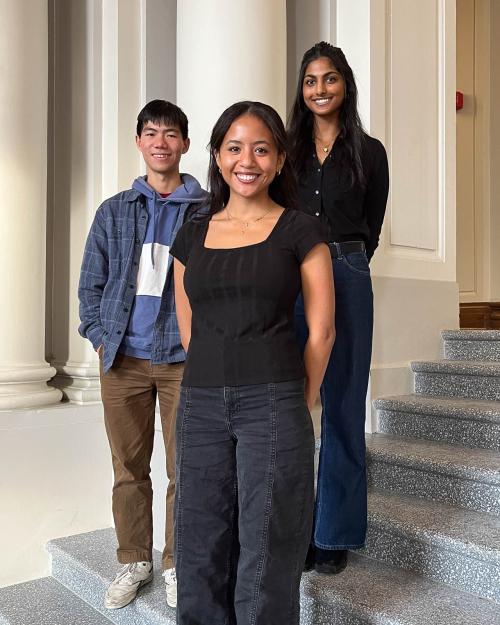Summer 2020. Traditional internships cancelled, replaced by the comfort (confines?) of childhood bedrooms, replete with old posters, trophies, and parents knocking on the door.
A lucky portion of you have had internships turn virtual, and others may have already found ways to fill their days, but a number of you are facing the scenario pictured above (potentially further complicated by an atypical semester), and are looking to stay productive in a less structured setting.
To help that goal, I’ve laid out a few of my accumulated thoughts and experiences – while I can’t admit to experiencing COVID-19 as a student, the below can help whenever you are looking to fill extra time productively, global pandemic or otherwise.
Let's Level SetWithout sounding too much like a self-help book (I’ll get there one day), here’s how I think about spending my time “productively”, for internships or general development: (a) what can I learn and (b) what experience will I gain? Approaching productivity from this angle allows me to spend my time in a focused, satisfying manner.
That said, for many Economics majors, part of this process of learning and experiencing is getting an internship. Around 80% of you will enter the professional workforce post-graduation, and roughly two-thirds of this group will enter traditional fields such as financial services and consulting. (See https://cornell.app.box.com/s/okn7798jsnim9drjdgi3vptwlppsmczn/file/646452440231 for an interesting employment data set on A&S and the Economics major.) For these groups especially, apart from learning and meeting new people, the signaling aspect of obtaining an internship is important as well.
Searching for Internships (In the Middle of Summer)Searching for work experience outside of traditional summer sessions, or for younger undergraduates in general, can be daunting.
The Usual SuspectsFor me, initially reaching out to my friends and family network was, well, network dependent – perhaps able to help me obtain an opportunity, but not necessarily in positions or industries I found most relevant. Cold-calling or emailing companies often elicited responses, but the “hit” rate on companies actually willing to take on students was low. Applying via online job boards was a bit of a black hole, with few responses (I will caveat this by saying that anecdotally, in recent years and months, the popularity of hiring websites, especially for virtual opportunities, seems to have increased), and Cornell’s Handshake, I felt, was mainly geared towards later stage summer internships or full-time jobs.
My Listserv PanaceaEven if you are not part of many organizations on campus, I highly recommend joining listservs for organizations of interest. Some simply require you to give your email address (e.g., Entrepreneurship at Cornell, an organization extremely helpful for me: http://eship.cornell.edu/), while others might require reaching out and stating membership interest (while certain clubs are selective, I found others were happy to add members to groups either permanently or at least preliminarily). Even relaying your professional interests to friends in professional organizations can prove fruitful (some opportunities might be solely for club members, but many are shareable).
Being privy to large sets of opportunities and companies can better help you land an experience that aligns with your educational and professional goals. It was from one such listserv that I was able to obtain a remote, paid, school-year internship during my senior year – I developed new skills, worked alongside a manager who am I in touch with to this day, and was able to rule out the job as a future career path.
CodaWith a targeted and persistent approach, you can find an internship that fits your goals and timing. Keeping a keen eye on listserv-generated opportunities can help you find flexible work experience that satisfies learning objectives, provides engaging experience, and builds your resume.
Career Exploration, Skills, and Personal ProjectsWhile internships are often an important part of one’s development, learning and engaging outside of the school or office environment (remote or otherwise) can enrich educational and professional experiences.
Career Exploration and Remote NetworkingWhat do I want to do post-graduation? Ten years down the road? How do I get there?
Do some LinkedIn stalking, google career paths, and think about what you like or dislike. If you do stumble upon anyone that has commonalities with you, or is doing something of interest, reach out to hear how they got to where they are. Clichéd, but this is something I wish I had done more of – you never know whom you will get to know or what you will uncover.
Skills DevelopmentRound out skill sets or add to your knowledge base.
For me, learning how to code was a valuable skill (Codeacademy is great, and free), augmenting statistics and data analysis skills I developed within the Economics major. I was able to use this knowledge to further my proficiency in both Excel VBA and statistical packages such as Stata and R. The former proved helpful during my internships and the latter during a senior research paper.
In terms of expanding your knowledge, Udemy classes are always a good option, but as an Economics major interested in business, one activity I enjoyed was reading business texts that related to my classwork. For example, after taking a class on Industrial Organization, I read Bruce Greenwald’s Competition Demystified; bridging the economic theory behind competitive strategy to real-world business scenarios was intriguing and solidified my understanding of the topic, helping differentiate future interview answers.
Personal ProjectsAs you take classes, learn, and pick up professional experience, a couple things might happen. You may have questions or thoughts on what it is you learned or experienced, and/or come across activities you would like to try your own hand at. My advice on this (another point I wish I had listened to years back) – just jump in!
If you have a question, explore it. Perhaps you’re wondering how virtual work is impacting the labor market. Read the literature, look at the data, and if it continues to interest you, maybe it’s the start of a research paper. Or, it could be the spark of an idea for a new club. For the aspiring financiers out there (if past employment data is an indicator, I’m sure there’s more than a couple of you!), start creating that personal investment portfolio or stock pitch write-up on Seeking Alpha. Whatever it is, applying your curiosities and learned knowledge to create something will not only help you refine interests, it will give you a sense of accomplishment.
Upwards and OnwardsDuring a typical school year, course loads, research, clubs, work, and social activities may take up the vast majority of your time. However, keeping the above perspective on internships and development, and more actively engaging this perspective during quieter periods, will better set you up for whatever you want to accomplish.
The tidbits I shared are starting points, but I encourage you all to think about how you can stay productive to reach your own goals, continue learning, and make the most of your time as undergrads!
Who am I? Class of 2017 Economics graduate, current Private Equity Associate at Corsair Capital (investing in insurance and fin-tech), former Investment Banking Analyst at UBS, and perennial fan of chess/swimming/all things Cornell.





